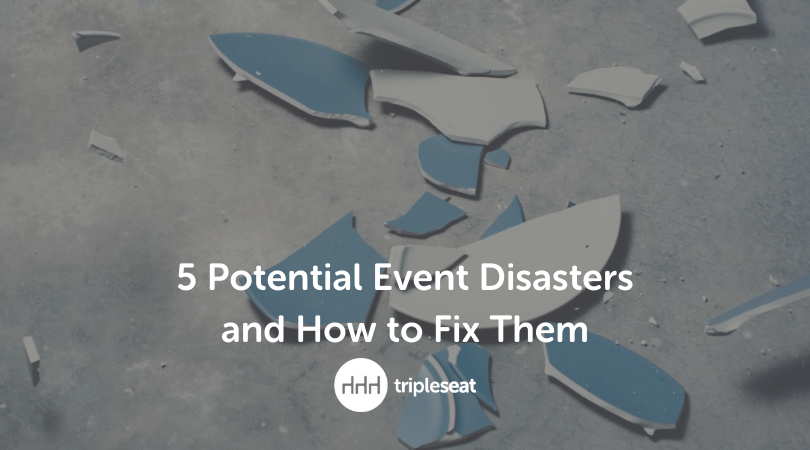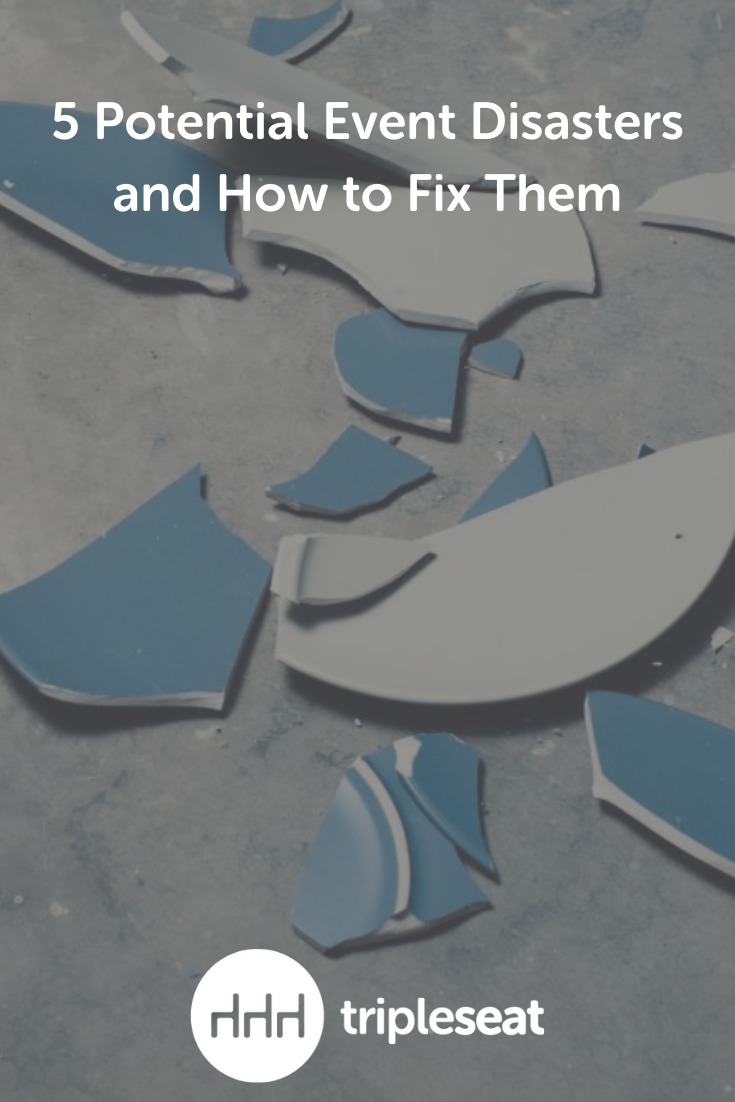5 Potential Event Disasters and How to Fix Them

There are plenty of ways to prepare your venue, your staff, and yourself to host a successful private event that goes off without a hitch. But when it comes to things like bad weather and unpredictable guests, sometimes there’s no way to know what will be thrown at you before night’s end. However, you can always do your best to expect the unexpected.
With that in mind, we’ve listed five common potential event disasters, along with ways to fix them. Don’t let a slip-up derail a celebration!
1. Bad weather
Inclement weather is one of the biggest potential event disasters since we have no control over it. A beautiful day can turn dark and rainy in a flash with little warning. Prepare for this by having a thorough, detailed backup plan and make mention of it in the event contract. Make sure to go over it with your client to ensure you’re on the same page.
This plan should include where the event will be moved to, who will be responsible for moving the food and any other items, any alternate routes for entering and exiting the event space, and details that will work to preserve the ambiance of the event. This way, your client won’t feel like they’re getting a subpar event just because the location has moved.
2. Power outages or technology glitches
Technology is unpredictable. And when it comes to electricity, all it takes is one overused outlet to blow a fuse and cause lights out for your entire venue. Don’t get left in the dark! Brief your kitchen and serving staff about the protocols for saving food during a power outage, in the event that your refrigerator and freezer lose power for a significant time.
Before the event, make sure you or the event coordinator know where the flashlights are (you should have multiple flashlights!) and where the fuse box is. Know whether or not you have a generator on-site, as any backup power sources can get you up and running quickly. Work to keep guests calm, and make sure everyone can exit safely if need be.
3. A missing or unavailable item
It happens: there’s a vendor miscommunication, a menu item doesn’t arrive on time, or you’ve underestimated the ratios of something you need on hand. It’s good to have backups when possible and feasible, such as chilled alcohol or extra loaves of bread and some cheese or tomatoes for crostinis if you need more appetizers.
Some of the most prepared event coordinators and venue managers go so far as to have a list of resources they can turn to on the fly. If a wedding cake doesn’t come, where’s the nearest bakery? If the DJ gets caught in traffic, how does the venue’s sound system work? It’s also wise to give yourself leeway to handle something not arriving or being unavailable.
Schedule item deliveries to arrive before you actually need them. It’s also a good idea to have the client’s full contract on hand during the event so you can reference it and know exactly what was ordered.
4. A problematic guest
Problematic guests can come in many forms. Some get overly intoxicated, some are demanding, and some are simply distracting. All of these can add up to an event that your client is unhappy with, so it’s your job to make sure that doesn’t happen.
But regardless of the person’s behavior, seasoned event pros know it’s crucial not to make a bad situation worse. Instead, handle the situation with tact. Keep things lighthearted so you don’t come off angry or end up disturbing other guests. Do your best to find the root of the problem, whether it’s a guest or just a bartender over-serving patrons.
Your client is always the top priority, so run your plan of action by them in the event you want to cut someone off or have them removed. Plus, they’re likely the best person to be able to properly diffuse whatever situation has arisen. If another staff member notices an issue, make sure they go directly to you or the event coordinator, instead of taking matters into their own hands.
5. A medical emergency
First things first: Keep calm! The last thing you want is panic on your premises. Have a first aid kit on-site, and make sure everyone knows its location. It’s also a good idea to have a staff that’s been through basic first-aid procedure training, such as the Heimlich maneuver.
As quickly as possible (as long as it’s safe and appropriate), do what you can to quickly separate and contain the emergency so it doesn’t ripple throughout the entire event. This is also an important time to know your liability and rights as an event venue. During the planning process, it’s wise to ask your client if they have event insurance, and what all is covered under their particular plan.
Get the right event management software
Tripleseat will help your venue keep track of every single detail and avoid potential event disasters. Successful events require everyone to be on the same page, from event manager to head chef. Tripleseat simplifies the event booking and planning process with one software for the entire team. Tripleseat’s event management system makes it easy to respond to leads, manage and communicate with guests, keep track of event details, take payments, and more.
If you’re not a Tripleseat customer and you’re interested in learning more about Tripleseat’s features, schedule a demo at your convenience to take a closer look.
Editor’s Note: This post was originally published on the Gather blog and written by Caroline Cox.


